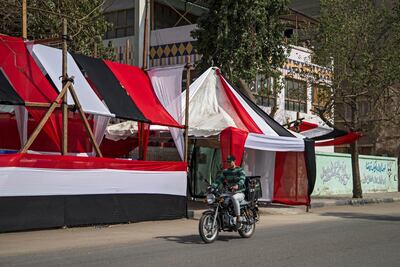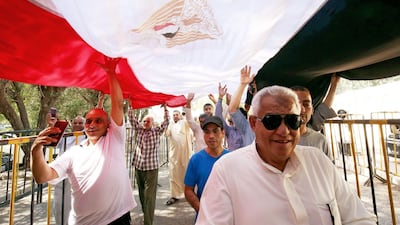Millions of Egyptians voted on Saturday in a hurriedly arranged referendum on contentious constitutional amendments that, among a raft of changes, will extend the president’s time in office.
If ratified after the three-day referendum, the amendments would allow the country's president, 64-year-old general-turned-leader Abdel Fattah El Sisi, to stay in office until 2030, confirm the military's supreme political role and grant the Egyptian leader significant control over the judiciary.
Egyptian expatriates began voting on Friday, also over three days, after the amendments were adopted by parliament on Tuesday.

While proponents say the amendments amount to needed political reform that will cement stability and economic recovery, critics dismiss them as a return to autocracy just eight years after a popular uprising toppled the 29-year regime of Hosni Mubarak.
The National Election Authority announced the date of the referendum less than 24 hours after parliament endorsed the changes, a surprisingly high level of preparedness given the massive logistics normally involved in printing ballot papers for the country's 60 million voters, organise transportation and accommodation for thousands of judges who would supervise the vote and mobilise tens of thousands of police and troops to secure polling stations.
Thousands of banners and billboard advertisements calling on voters to back Mr Sisi and vote for the amendments flooded the streets of Cairo, the Egyptian capital, and other cities across the country days before Tuesday's parliamentary vote and the announcement of the dates of the referendum the following day.
Authorities and the pro-government media have sought to play down or make no mention at all of the extension of presidential terms and allowing Mr El Sisi to stay in office until 2030, but images of the Egyptian leader feature on many of the banners and billboards urging voters to support the changes, making it clear that the entire process is mostly about him.
Opposition parties have called on Egyptians to reject the amendments at the ballot box, but were left with only social media networks – the main platform for free speech in today's Egypt – to explain their cause.

Security was tight across the city on Saturday, with tens of thousands of police and troops guarding polling centers, where patriotic songs are played at deafeningly high volume, including a single by Lebanese diva Nancy Agram. “The one whose heart is in the country, is a man and a son of a man,” she sings, in what’s widely interpreted to be a reference to Mr El Sisi.
The centres are festooned with giant Egyptian black, red and white flags. Banners calling on voters to support the changes were hoisted over some polling centres.
Policemen, both uniformed and plainclothes, were deployed at Cairo’s iconic Tahrir square, birthplace of the 2011 uprising that toppled Mubarak's autocratic rule.
At the square, which is heavily plastered with banners supporting the amendments, patriotic songs blared from giant speakers perched at the back of a truck. Young women and men wearing white shirts emblazoned with “do the right thing” on the back milled around the square and elsewhere in the city.
Several hundred teachers waving flags and carrying banners supporting the amendments marched to live music at the heart of Cairo heading to the teachers union building on the western bank of the river Nile.
Last month, opposition parties were denied a security permit to stage a sit-in outside parliament to voice their objection to the amendments. Parliament's speaker, Ali Abdel-Aal, said at the time that a "societal debate" on the changes which he chaired at the house was sufficiently inclusive and rendered the gathering unnecessary.
Egypt has blocked most demonstrations since 2013, but authorities tolerate small ones by government supporters, like that of the teachers on Saturday.
It's difficult to predict the outcome of the referendum with any accuracy in a country where reliable opinion polls don't exist, but a majority "yes" vote is a virtual certainty in this case given the state's vast resources will likely be rolled out to rally support for the amendments. However, what's important for the government will be to ensure a respectable turnout to avoid questions of the legitimacy of the changes.
That the vote is staggered over three days through to Monday is partially designed to maximise turnout. Businessmen loyal to the government offer goods and money to registered voters to encourage them to come out and vote. Their representatives, mostly young men in their 20 and 30s, could be seen organizing the distribution on Saturday outside several polling centres at poor areas in central Cairo.
"I will vote but this is a bribe that I will not accept," said Mohammed, a 62-year-old Cairene who was let go from his construction company when it was privatized in 2003. Mohammed, who drives a taxi to supplement his monthly $90 pension, said he planned to vote in support of the amendments.
"I just hope that they will increase my pension as they promised," he said as he made his way to the southern Cairo district where he intended to vote.
Some of the amendments included in the changes that Egyptians will vote on are likely to help secure a "yes" vote, such as allocating 25 per cent of parliament's seats to women that will appeal to female and some progressive voters.
Mr El Sisi has in his five years in office gone to great length to empower women and defend them against discrimination or harassment. He has tirelessly thanked them in public for enduring the steep price rises that resulted from his economic reforms.
He has a record six women in the current cabinet.
Ensuring "suitable" representation in parliament for minorities, Egyptian expatriates and people with special needs is another amendment that would likely deliver more tallies for the "yes" column.
Mr El Sisi has endeared himself to Christians, the country's largest minority with about 10 per cent of Egypt's 100 million people. He has eased restrictions on the building of new churches or the renovation of existing ones and also insisted that new cities under construction have a sufficient number of Christian places of worship.
Many in the Christian community revere Mr El Sisi for the 2013 removal of a divisive Islamist president they feared would disenfranchise them. While he has the backing of many Christians, some vocal members of the community believe he has not done enough to protect them against the transgressions of radical Muslims in rural areas, including attacks on churches.
The most contentious amendment is the extension of presidential terms from four to six years.
The two-term cap on a serving president in the 2014 charter has been kept, but a new clause tailor-made for Mr El Sisi extends his current second term from four to six years – giving him two extra years before a vote when his extended term runs out in 2024. He will also then be allowed to run for a third, six-year term.
Mr El Sisi was elected in a landslide in 2014. Last year, he won a new, four-year term after he ran virtually unchallenged when his serious challengers dropped out citing intimidation and one of the highest profile rivals, former military chief of staff Sami Anan, was arrested for breaking military code by not getting approval for his run.

In the end, Mr El Sisi ran against a little-known politician known to be among his supporters.
Opponents to the changes criticise the terms and also parliament’s handling of the bill. "It's illegitimate. It's ... an act of contempt for the constitution," Nour Farahat, one of Egypt's most prominent legal experts, wrote on Facebook.
Abdullah El Sinnawy, a prominent columnist and a one-time supporter of Mr El Sisi, wrote in Cairo's independent Al Shorouk newspaper on Wednesday that parts of parliament's handling of the amendments amounted to "complete contempt" for the rules and principles of today's world. He also criticised the tailor-made clause allowing the president to stay in office beyond his two terms, arguing that "personalized" clauses are not acceptable in constitutions.
"What safeguards stability in this country is for its living political forces to emphasize, as much as they could, respect for modern constitutional rules, not try to circumvent them," he wrote.
Mr Abdel-Aal, among the most vocal supporters of the president, has said that focusing the conversation on the presidential terms was unfair and biased.
Proponents like Mr Abdel-Aal dismiss criticism of the changes, arguing that Mr El Sisi has no lust for power and that his major contributions to security, the economy and infrastructure warrant a longer stay in office to complete his ambitious plans.
In keeping with procedural protocol, the president has remained publicly silent on the changes, conducting business as usual throughout the process that began in early February, including a tour of West Africa and a White House meeting with President Donald Trump.On Saturday, he discussed bolstering the country’s petrochemical industries with his prime minister and his oil minister, according to a presidential statement.


